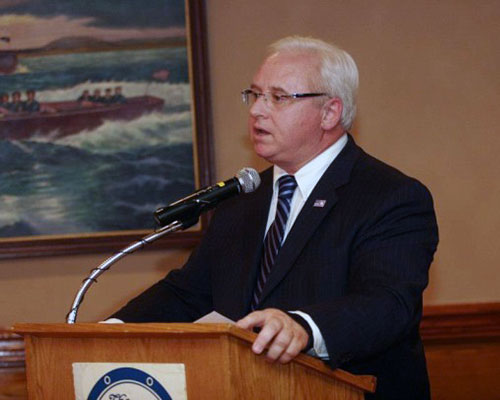Essex County District Attorney Jonathan W. Blodgett.
Part 1 of 2.
A recent decision to “divert” a Haverhill public works employee from the court system over a drug possession charge to a drug treatment program has helped raise awareness of a little-known effort targeting addiction.
In the first of a two-part series, Essex County District Attorney Jonathan W. Blodgett tells WHAV listeners how the program started, who it is helping and why it is a benefit for the community.
“We saw so many families that were struggling with this, cutting across the entire county, the entire socio-economic stratus,” he said.
Blodgett said he was made aware of the extent of the region’s heroin problem when he first took office in 2002. The problem was persistent in urban and rural centers alike. Early on, he recognized the need to make a distinction between those hooked on drugs and those criminals selling heroin.
“Here in Essex County—in the criminal justice system—we are very much able to differentiate between somebody who suffers from the disease of addiction and someone who is a trafficker.”
During a chance, Boston meeting with state Sen. Steven A. Tolman in 2006, Blodgett said, the seeds of a new diversion program were planted. Noting the success of a juvenile effort, Tolman helped secure a state Department of Public Health grant to try something new. At first, the plan was to have the Essex County District Attorney’s office run the program. Blodgett, however, said medical professionals—and not lawyers—were a better fit. In the end, Project COPE-Bridgewell, of Lynn, was retained.
“We determine the eligibility so we take people who are non-violent offenders who have a little or no record and give them the opportunity to get drug treatment in lieu of prosecution.”
At first, the effort was aimed at youthful offenders up to the age of 24 and available only in two of eight district courts. Blodgett said, the program evolved and no longer has age limits and is available at all courts. Minor drug offenders may be accepted into the program either before their first court date or just after arraignment. Avoiding court, Blodgett said, is “a great motivation to get the help and treatment they need.”
Those successfully completing what has become an award-winning diversion program may walk away without a criminal record.
“It’s a chance to just walk away, frankly, from the situation that brought them to us.” the district attorney said.”
Tomorrow, in part two, Blodgett describes the drug treatment program and what happens to those who can’t break their drug habits.


“Those successfully completing what has become an award-winning diversion program may walk away without a criminal record,” Blodgett says. My question is — what happens if this person (or anyone else for that matter) completes the program and then is arrested again for the same offense? Is he then hauled off to court? Or is he required to complete the program again and again.
AND, it took Blodgett from 2002 to 2017 to put something in place? What has he been doing in the meantime? Has he not seen or been aware of the problems that exist and that have been existing for quite some time now? Is it because this man works for the city that Blodgett has decided to get off his duff and do something meaningful?
Avoiding court, Blodgett said, is “a great motivation to get the help and treatment they need.”
More liberal, subjective BS and lies!!! The fear of going to jail is a much greater motivating factor than knowing you have a weak, liberal court system you can fall back on if you get caught.
Never trust a liberal democrat government official selling the imaginary benefits of more and bigger government programs. As expected, liberals giving themselves awards and trophies never discuss actual statistics relating to recidivism, success rate of program enrollies or how many people don’t finish the program.
An intelligent step in the right direction.
This is good